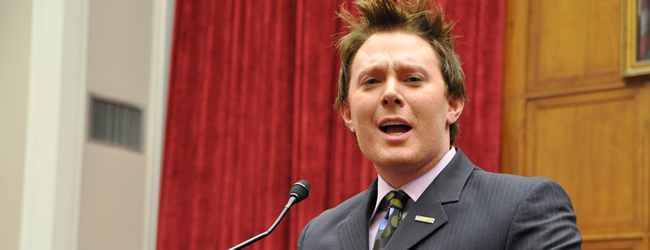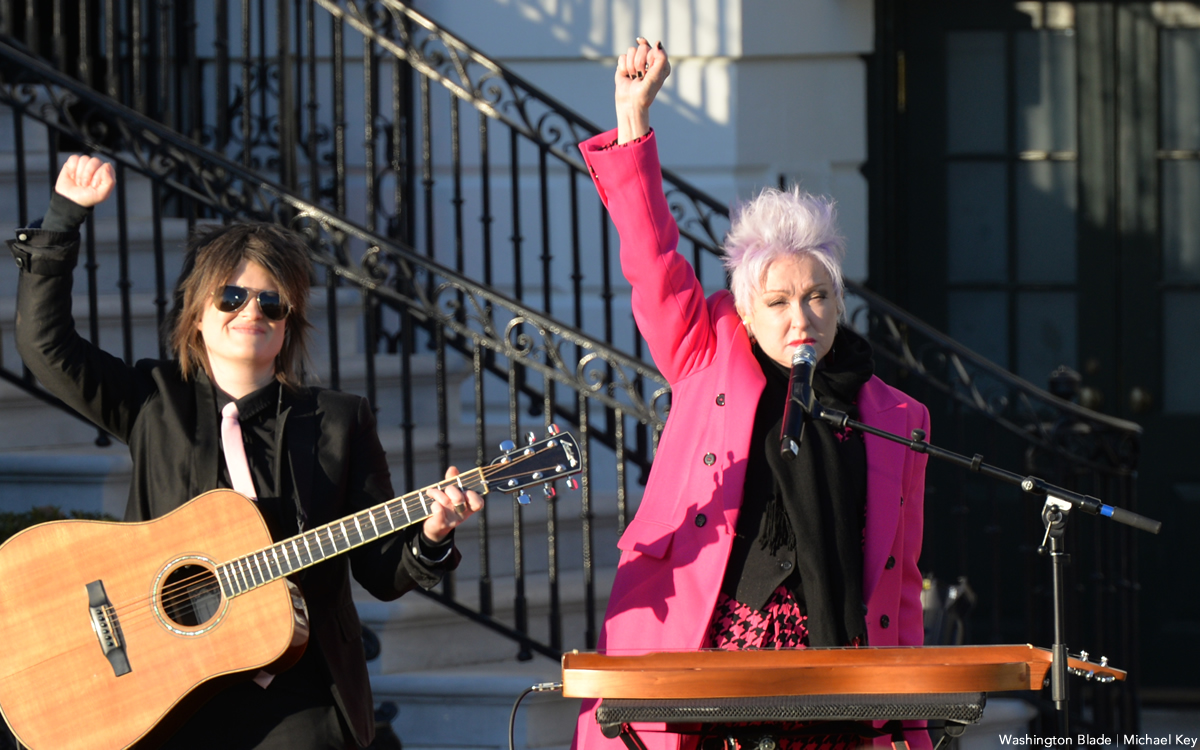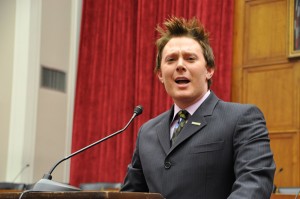Music & Concerts
Clay Aiken, parents join lawmakers to push anti-bullying bills
‘American Idol’ singer tells Capitol Hill briefing he suffered taunting

“American Idol” singer Clay Aiken and two mothers whose sons committed suicide because of anti-gay bullying at their schools appeared at a Capitol Hill briefing Thursday to urge Congress to pass two bills that would require schools to address bullying and harassment targeting LGBT students.
The Gay, Lesbian and Straight Education Network (GLSEN) organized the briefing as a means of drawing public attention to the two pending bills, the Safe Schools Improvement Act and the Student Non-Discrimination Act.
“Like many kids now in middle schools and high schools, I was bullied,” said Aiken, who came out as gay in 2008 after winning the runner up title of best singer on the widely viewed television show “American Idol.”
“I was picked on, I was called gay, I was called fag, I was called sissy, you name it,” he said. “Fortunately, I was able to overcome it and live through it because of a number of friends who were supportive of me.”
Aiken and Louis Van Amstel, host of the television show “Dancing with the Stars,” joined parents Sirdeaner Walker of Massachusetts and Tammy Aaberg of Minnesota in making an impassioned plea for lawmakers to pass the two bills. Sirdeaner and Aaberg’s sons took their own lives earlier this year due to anti-gay bullying.
“Over the past few months I have heard so many stories about other youth who were suffering,” said Walker, who lost her 11-year-old son Carl Joseph Walker, who hanged himself in his bedroom with an electrical cord.
“Too many of our children are being tormented in schools – and not enough of our adults are doing the right thing and teaching respect for all. Enough is enough,” she said.
Sen. Bob Casey (D-Pa.) and Rep. Linda Sanchez (D-Calif.), who introduced the Safe Schools Improvement Act, and Sen. Al Franken (D-Minn.) and Rep. Jared Polis (D-Colo.), who introduced the Student Non-Discrimination Act, also spoke at the briefing, calling on their colleagues to support the legislation.
“No student should have to dread going to school because they fear being bullied,” Franken told those gathered for the event, held in a committee hearing room at the Rayburn House Office Building. “We must address bullying and harassment in schools in the next Congress.”
Polis, who is gay, said school bullying affects students living in both Republican and Democratic leaning states, saying he would work with his colleagues on both sides of the political isle to push for passage of the legislation.
“Every student has the right to an education free from bullying, harassment and violence, and we are here today to show that Congress is ready to take a stand against bullying in our schools,” he said.
Franken and Casey cited recent cases of suicides due to anti-gay bullying in their home states. They pointed to what they called a courageous decision by Walker and Aaberg to speak at Thursday’s briefing to tell the stories of the loss of their own teenage sons as a means of drawing support for the legislation.
“Recent stories of the tragic effects of bullying in Pennsylvania and throughout the country are evidence of the urgent need to address this issue in our schools,” Casey said. “We owe it to our children to do whatever we can to ensure their pleas for help do not go unheard.”
Casey introduced to the briefing Joey Kemmerling, a high school student in Bucks County, Pa., near Philadelphia, who helped form an anti-bullying group as well a Gay-Straight Alliance organization at his school.
“I came out in eighth grade and ever since then I have been bullied every day,” Kemmerling told the briefing. “There’s not been a day that has gone by where I have not heard the word faggot, queer or fairy or told that I was not human.”
He described an incident when another male student threatened him with a knife on the school grounds after school officials declined Kemmerling’s plea that they search the student for a weapon.
“He came up to me and he looked me in the eyes and he had the look of hatred,” Kammerling recounted. “I didn’t know who he was but I knew that he hated me. And he said, ‘Your life is in my hands.’ And he walked away.”
The incident caused him to become deeply depressed and to contemplate suicide, Kammerling said.
“I thought I didn’t deserve to live. I was gay so did my life really matter? I didn’t think so,” he said.
“I almost committed suicide, and somehow I overcame that and started working to change the schools,” he said. “I was so thankful to meet GLSEN and work with them to fight all injustices all around the United States.
“I really just hope you’ll join me in that fight because the real change is going to come from society and the change is going to come from the people stepping up and saying, ‘I don’t want to see another kid ever go through what I went through and what the students went through that committed suicide.'”
His remarks drew a loud and prolonged applause from the audience, which included staff members of senators and members of the House.
GLSEN Executive Director Eliza Byard said she was hopeful that Congress would act on the two bills next year despite reports by Capitol Hill observers that the new Republican controlled House of Representatives would block all LGBT-supportive legislation.
“They currently have bipartisan support in this Congress,” Byard said. “And I think just as children’s safety, it’s not a gay or straight issue, it is not a Republican or Democratic issue.”
The Safe Schools Improvement Act requires schools receiving federal funds to develop policies to prohibit bullying based on race, sex, national origin, religion, sexual orientation and gender identity and expression. It has 130 co-sponsors in the House and 15 cosponsors in the Senate.
The Student Non-Discrimination Act calls for providing protections to students who are targeted for bullying, harassment and discrimination based on their “actual or perceived” sexual orientation or gender identity. It currently has 127 cosponsors in the House and 30 cosponsors in the Senate.
Franken said he has proposed that the Student Non-Discrimination Act be incorporated as an amendment to legislation reauthorizing the longstanding and highly popular Elementary and Secondary Education Act, which Congress is scheduled to vote on next year.
Music & Concerts
Washington chorale kicks off Christmas with vibrant program
‘Thine Own Sweet Light’ concerts planned

The full Washington Master Chorale will return for its annual holiday concert tradition with “Thine Own Sweet Light” on Friday, Dec. 19 and Sunday, Dec. 21 at St. Ann’s Catholic Church (D.C.) and Church of the Epiphany (D.C.).
The concert will feature the rich sounds of the 50-voice, a cappella chorus performing lush, seasonal choral music inspired by the theme of light. Highlights include Edvard Grieg’s “Ave Maris Stella,” Eric Whitacre’s “Lux Aurumque,” and Christopher Hoh’s “Holy, Holy, Holy is the Lord God of Hosts.” The program will also present a new work by Barcelona composer Josep Ollé i Sabaté, along with charming holiday folk songs and seasonal favorites.
For more details, visit the Washington Master Chorale website.
Music & Concerts
Queer mega stars (and allies) ready to take D.C. stages this fall
Watch LGBTQ icons light up stages across the DMV as they sing, dance, and drag their way through spectacular shows.

One of the best ways to welcome fall is by catching LGBTQ performers (and their allies) lighting up some of the D.C. area’s biggest stages. From country and pop to drag and rock, the season is packed with shows you won’t want to miss.
Maren Morris – The country, rock, and pop diva—known for hits like “The Bones” and for standing up against Nashville’s anti-LGBTQ voices—takes the stage at Wolf Trap (1551 Trap Rd, Vienna, Va.) on Friday, Sept. 12 at 8 p.m. Tickets start at $64.
RuPaul – The mother of modern drag and host of “RuPaul’s Drag Race” will spin a DJ set at Echostage (2135 Queens Chapel Rd NE) in Northeast D.C. on Sept. 20. Before RuPaul swaps wigs for headphones, Trade and Number 9 owner Ed Bailey will warm up the decks. For tickets and details visit echostage.com.
Conan Gray – The queer pop prince, celebrated for his Gen Z anthems like “Heather” and “Maniac,” brings his Wishbone Pajama Show to EagleBank Arena in Fairfax, VA, (4500 Patriot Cir) on Sept. 20 at 8 p.m. Tickets start at $113. For more info visit shop.conangray.com/pages/tour.
All Things Go Music Festival – With a lineup that includes Noah Kahan, Lucy Dacus, Kesha, Clairo, Doechii, and more, the beloved LGBTQ-friendly festival takes over Merriweather Post Pavilion (10475 Little Patuxent Pkwy, Columbia, Md.) Sept. 26–28. For tickets and details visit allthingsgofestival.com.
BERTHA: Grateful Drag – This unique tribute brings drag artistry and the sounds of the Grateful Dead to The Atlantis (2047 9th St NW) on Sept. 27. Tickets start at $47 at theatlantis.com.
Peach PRC – Rising Australian pop star and out lesbian, whose confessional tracks like “Perfect for You” and “Forever Drunk” have made her a queer TikTok darling, performs at The Atlantis on Sept. 29 at 6:30 p.m. The show is general admission only. Additional details are on theatlantis.com.
Addison Rae – The TikTok star-turned-pop princess, who’s crossed over into music with glossy hits like “Diet Pepsi” brings her sold out show to The Anthem (901 Wharf St., S.W.) on Sept. 30. Tickets are sold out, but resale options start around $80. For more info visit theanthemdc.com.
The Rocky Horror Picture Show 50th Anniversary – Celebrate the cult classic that’s been a queer midnight-movie staple for decades, with Barry Bostwick (a.k.a. Brad Majors) at the Warner Theatre (513 13th St., N.W.) on Oct. 2 at 8 p.m. Tickets start at $41 via Ticketmaster.
Chaka Khan, Patti LaBelle, Gladys Knight & Stephanie Mills – Four legends, one stage. Between Khan’s funk, LaBelle’s soul, Knight’s R&B, and Mills’ powerhouse vocals, this concert at Capital One Arena (601 F St NW) on Oct. 3 at 8 p.m. promises pure diva magic. Tickets start at $103. For more details visit capitalonearena.com.
Lorde – Joined by The Japanese House and Chanel Beads, the Grammy-winning New Zealand singer-songwriter behind “Royals” and “Solar Power” returns to The Anthem on Oct. 4 at 7 p.m. Lorde has long been embraced by queer fans for her dreamy pop and subversive lyrics. For more info visit theanthemdc.com.
Andy Bell (of Erasure) – The British queer rock icon, best known for synth-pop classics like “A Little Respect” and “Chains of Love,” brings his Ten Crowns Tour to the Lincoln Theatre (1215 U St., N.W.) on Friday, Oct. 17 at 8 p.m. Tickets are $90.45.
Doechii – The self-described queer “Swamp Princess”—and WorldPride 2025 headliner—continues her breakout year with the Live from the Swamp Tour at The Anthem on Oct. 21 at 8 p.m. Known for blending rap, R&B, and avant-garde performance art, Doechii is one to watch. Tickets start at $153.
Neon Trees – The out-and-proud Utah rockers behind “Everybody Talks” and “Animal” perform at the Lincoln Theatre on Friday, Oct. 24 at 8 p.m. Lead singer Tyler Glenn, who came out publicly in 2014, has become a strong queer voice in alternative rock. For tickets and info visit impconcerts.com.
Sasha Colby – The “RuPaul’s Drag Race” Season 15 winner strips down on the Stripped II Tour at the Warner Theatre on Nov. 2 at 8 p.m. Tickets available now on Ticketmaster.
Lola Young – The bisexual indie-pop sensation, whose raw songwriting has earned her millions of TikTok fans and multiple chart soaring hits visits The Anthem on Nov. 9 at 8 p.m. Tickets are still available.
Opera Lafayette
Featuring Mary Elizabeth Williams as Dido
+ Elijah McCormack, Chelsea Helm
Oct. 16, 7:30 p.m.
Sixth & I
PostClassical Ensemble
The Pale Blue Do: A Musical Voyage Inspired By Nature
Featuring National Geographic’s Enric Sala, Guest Curator
Wednesday, November 19, 7:30 p.m.
Terrace Theater
Washington Concert Opera
Starring Kate Lindsey, Theo Hoffman, John Moore, and Fran Daniel Laucerica
Nov. 23, 6 p.m.
Lisner Auditorium
Washington Master Chorale
An intimate a capella concert taking place in an architectural jewel, featuring cherished choral gems from Anglican and Catholic tradition and early American hymns. The concert will also present the world premiere of Christopher Hoh’s Holy, Holy, Holy is the Lord God of Hosts, and hymn singing featuring Robert Church, organist and choirmaster at St David’s.
Oct. 18, 7:30 p.m.
October 19, 5 p.m.
St. David’s Episcopal Church
Music & Concerts
Cyndi Lauper ready to have fun in Virginia
Superstar to bring final leg of farewell tour to Jiffy Lube Live

Superstar Cyndi Lauper will bring the final leg of her farewell tour “Girls Just Wanna Have Fun” to Bristow, Va., on Thursday, July 24 at Jiffy Lube Live.
Lauper’s international Farewell Tour – her first major headlining run in a decade – kicked off in North America last October, and included her first time ever headlining (and selling out) Madison Square Garden. Lauper’s performances have earned raves from the New York Times, Rolling Stone, Billboard, and many more, and surprise guests have included Chaka Khan, Sam Smith, and Hayley Williams. The tour just visited the U.K. and Europe, and will head to Australia and Japan in April.
Tickets are available on Live Nation’s website.





















